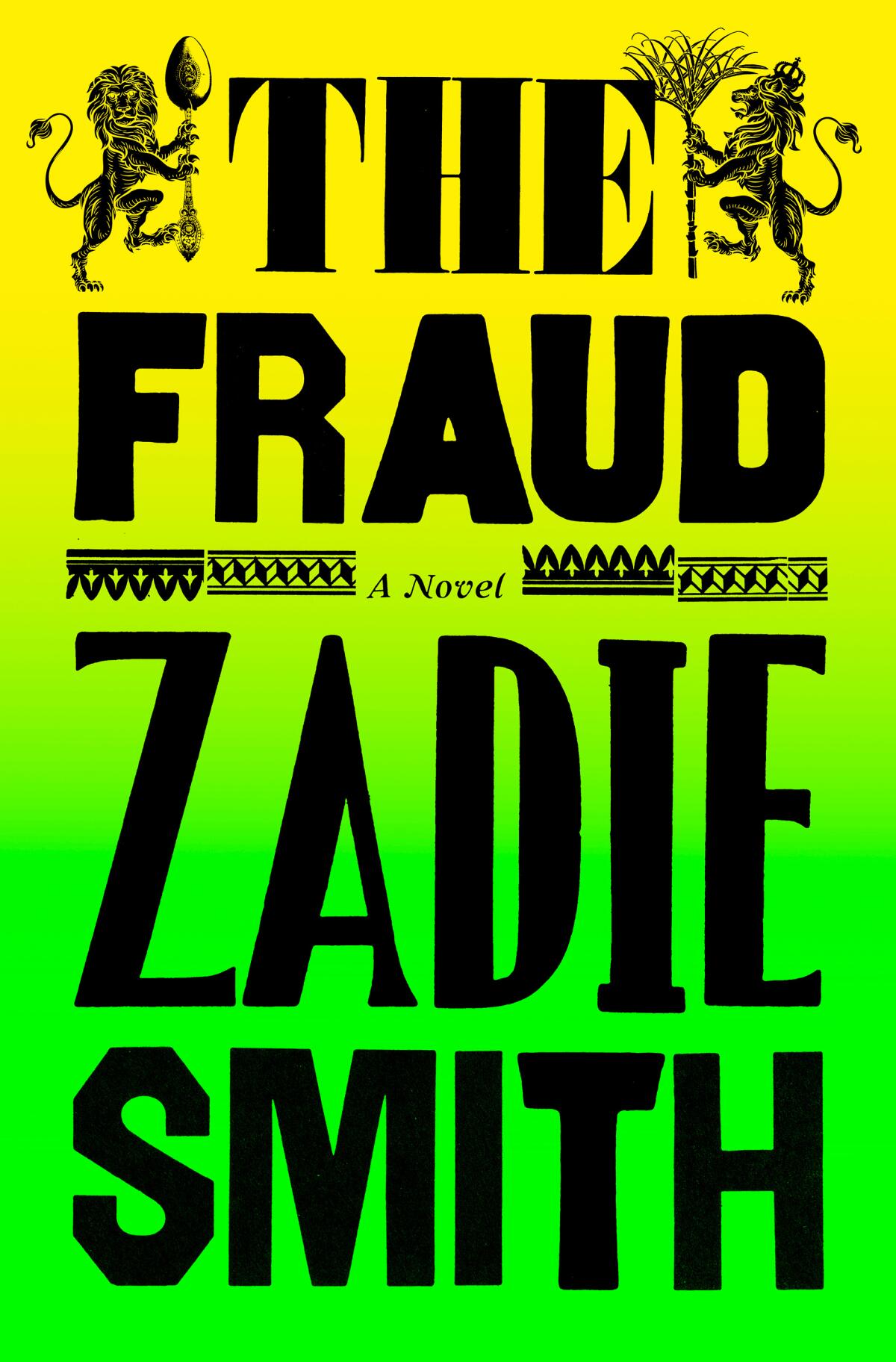What Zadie Smith’s new Dickensian delight tells us about the Trump base

- Share via
Review
The Fraud
By Zadie Smith
Penguin: 464 pages, $29
If you buy books linked on our site, The Times may earn a commission from Bookshop.org, whose fees support independent bookstores.
Zadie Smith’s new novel, “The Fraud,” is a Dickensian delight. Not only is it set in 19th century England with a sprawling cast of characters high and low, but Charles Dickens himself makes an appearance, charming everyone except those who envy his success. But there’s more to this brilliant new entry in Smith’s catalog than a simple literary romp.
At the center of the story is the widow Eliza Touchet, who runs the house of her cousin by marriage, William Ainsworth, a popular novelist. Touchet — she pronounces it the French way — is observant and astringent, tall and imposing. If she’s the kind of character who might only get a walk-on in Victorian novels, here her sharp voice is a constant companion.
“William had not written a word of his novel since February,” she notices. “Besides, the writing of novels — even good ones — did not seem, to Mrs. Touchet, a rational response to a financial crisis.”
“As a writer, I am stealing continually,” Zadie Smith said. “I would use the word voyeurism.
The novel has several disparate threads: First, there is the decades-long tale of Ainsworth’s literary life and home, then a sensational trial that captivated the public. Add to this the distant trade in enslaved people, layered over with Touchet’s own closely held secrets. That the entire tapestry flows so seamlessly across decades, weaving in shared intimacies, massive crowd scenes and dusty literary gossip, is a testament to Smith’s craft.
She begins in 1873, when Ainsworth’s career is in slow decline and the Tichborne trial in high gear. Both are based in fact — Ainsworth was a prolific 19th century novelist, and newspapers avidly followed the court case of a man purporting to be Roger Tichborne, the lost son of a wealthy, titled family. His claim becomes a populist cause despite there being very little evidence on his side. Hence, “The Fraud.”

But of course, a good title is never about just one thing. Is a successful novelist, one who can (briefly) outsell Dickens, kidding himself about the quality of his work? What might trouble a nice white lady’s dedicated support of abolition and the much-delayed end of slavery in the British colony of Jamaica? If a sexually liberated woman presents herself merely as a buttoned-up house manager, is there something false about that facade?
In her private life, Mrs. Touchet is modern in her appetites. Like the fictionalized Emily Dickinson of the Apple TV+ show, she has lovers, male and female. In both narratives, the modern twist works, no matter how fanciful or anachronistic it may be. Readers can see how layered her relationships are; for Mrs. Touchet, it’s certainly more fun.
Smith fans — and there are many — might consider a book some have framed as historical fiction to be a detour. Since her smash hit debut “White Teeth” in 2000, Smith has been known for kaleidoscopic tales set in contemporary London, many-voiced stories that shine a light on immigrant communities and class with verve and wit. She is a keen observer in her nonfiction and an insightful critic who seems eager to stretch her gifts. Her first play, performed in 2021, was “The Wife of Willesden,” a rewrite of Chaucer’s tale “The Wife of Bath.” “The Fraud” is not a change for Smith, but a demonstration of how expansive her talents are.
Fiction from Zadie Smith, Yiyun Li and Jesmyn Ward, memoirs from Sly Stone and Werner Herzog and a bio of Elon Musk are among the fall’s most anticipated books.
There is, in fact, nothing musty or “historical” about Touchet’s arch voice or the timeless parade of literary and political folly that animates the novel. When Ainsworth is still on his first marriage, overflowing with enthusiasm and a mainstay of a new literary scene, Touchet wryly observes his writing habits: “Not infrequently, he wrote twenty pages in an afternoon. He always appeared entirely satisfied with every line.” He hosts many literary dinners, where the likes of publisher Edward Chapman and writer William Makepeace Thackeray might be calling for more port. Touchet observes it all — she’s carrying the bottle.
The writers exude genuine camaraderie, but also petty jealousies and shifting alliances that play out over decades. Dickens is the slightly younger newcomer with an undeniable brilliance. Late in the book, Ainsworth and Dickens and Touchet enjoy a high-spirited visit to Lady Blessington and Count d’Orsay at Gore House. Smith doesn’t belabor who these people are, but it’s easy to tell they were rich and famous and a little bit scandalous.
As the trial heats up, Mrs. Touchet and the second Mrs. Ainsworth, despite being polar opposites, team up to go to court and watch it in person. Sections of the book cover the court proceedings, dramatized to excellent effect.
The case is this: Roger Tichborne had left England for South America and during his travels was in a devastating shipwreck. Rumors spread that some travelers had survived and surfaced in Australia. When an English man who’d been living in Australia returned and presented himself to the family, his mother recognized him but the rest of the family did not. She promptly died, and a fortune was left at stake.
The Claimant (as the papers called him) became a populist cause celebre. No matter how tenuous his story, massive crowds supported him, wanting him to win even if they could see his falseness. Shares were sold against his future inheritance; at speaking engagements, his supporters might grow enthused, unruly, incensed.
“Room” novelist Emma Donoghue on the historical queer romance — and the personal schoolgirl love affair — that inspired her novel “Learned by Heart.”
Touchet thinks he’s an imposter; yet she makes sure to see the spectacle. “Frequently, she heard the cry: A hanging’s too good for them! She tried to remind herself that what she was witnessing was a sincere mass emotion — dispossession — being twisted and manipulated for ulterior purposes. Still, they frightened her. Were these ‘the people’?” Smith, who split her time between New York and London in recent years, captures the feeling of watching MAGA rallies on TV, or the mob converging on the U.S. Capitol on Jan, 6, 2021. Are these “the people?”
What truly fascinates Touchet is the key witness for the Claimant, a former servant and employee of the Tichborne family, Andrew Bogle. Born in Jamaica when it was a colony that still enslaved Black people, he was brought back to England as an adolescent to work for the Tichbornes. He consistently repeats that the Claimant is Tichborne, whom he’s known since childhood. The elderly Bogle’s measured support of the Claimant stands in contrast to much of the court proceedings, as well as the shouting crowds at his events.
Touchet gets Bogle and his adult son to trust her by telling them she’s a writer. She does start to write things down, at least. Yet the book breaks away from the case to tell the story of Bogle in Jamaica — a different form of storytelling entirely. Immediate and damning and heart-wrenching. Things improve for Bogle in England, but not nearly enough.
For almost 100 pages, we get Bogle’s story, then are returned to the Tichborne trial and Touchet’s wry point of view. The tension, understandably, slackens. Sure, there are mysteries to be solved: What’s happening with Touchet’s inheritance? Who’s been sending poison pen packages to Ainsworth? What will the verdict be? And yet, after the intensity of Bogle’s story, it’s hard to return to the frivolity of the London scene and Touchet’s relatively minor troubles.
Perhaps, though, that is part of the point. What was supporting the grand mansions and the literati in England in the middle of the 19th century? It was colonization, including the sugar plantations in Jamaica and the terrors faced by those enslaved there.
This is, primarily, a story of people living privileged literary lives. Yet Smith has smuggled in another story, one that had been hiding inside it all along.
Kellogg is a former books editor at the Times.
More to Read
Sign up for our Book Club newsletter
Get the latest news, events and more from the Los Angeles Times Book Club, and help us get L.A. reading and talking.
You may occasionally receive promotional content from the Los Angeles Times.












